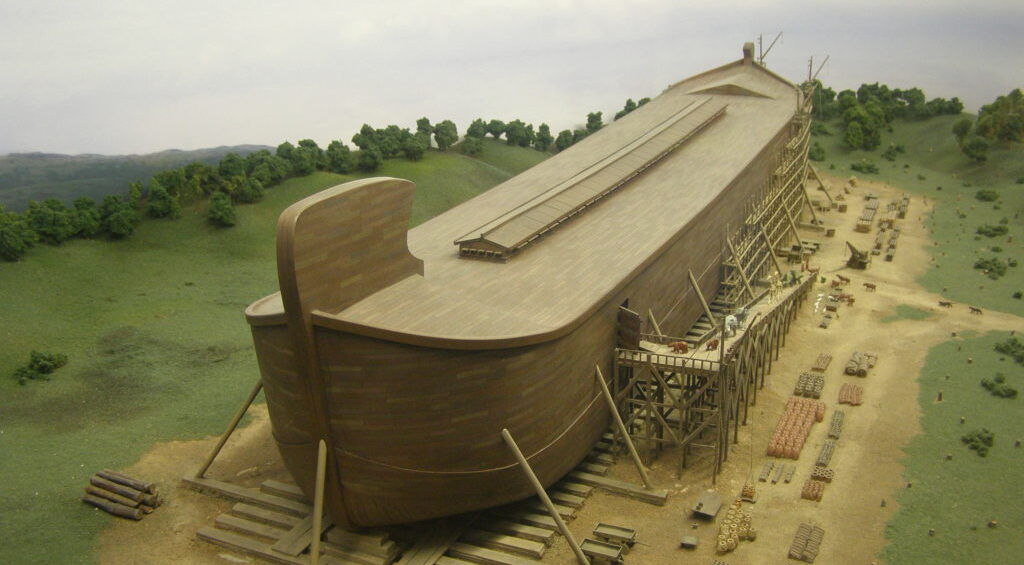

Genesis 9 within the Greater Bible Story
( Part One, Part Two, Part Three)
The story of the Flood is foundational to understanding how meat-eating is viewed in the following books of Scripture. These chapters help to explain the ‘why’ of meat-eating and killing of animals for food within Israel. In this sense, Genesis chapters 6-9 are in fact crucial in understanding how meat-eating came to be within the Old Testament and ultimately in Jesus’ time. No doubt, later other reasons for meat-eating arose, such as necessity because of a lack of food in certain areas and situations, or simply because it became a part of the culture and was normalised. This is to say that meat-eating became a cultural norm and was no longer necessarily based on hard-heartedness or rebellion as it had been originally, but was simply inherited from the surrounding culture as part and parcel of human existence. This may have been one of the reasons Jesus was willing to interact with it in his time.[1] Nevertheless, even after the Flood, in Deuteronomy for example, meat-eating is still clearly described as a reluctant concession to human beings. Notice how these two passages in Deuteronomy closely mirror each other:
When the Lord your God has enlarged your territory as he promised you, and you crave meat and say, “I would like some meat,” then you may eat as much of it as you want. (Deut. 12:20).
When you enter the land the Lord your God is giving you and have taken possession of it and settled in it, and you say, “Let us set a king over us like all the nations around us,” be sure to appoint over you a king the Lord your God chooses. (Deut. 17:14-15).
And now relate them to how the Lord considered Israel’s request to have a King:
So all the elders of Israel gathered together and came to Samuel at Ramah. They said to him, “You are old, and your sons do not follow your ways; now appoint a king to lead us, such as all the other nations have.”
But when they said, “Give us a king to lead us,” this displeased Samuel; so he prayed to the Lord. And the Lord told him: “Listen to all that the people are saying to you; it is not you they have rejected, but they have rejected me as their king. As they have done from the day I brought them up out of Egypt until this day, forsaking me and serving other gods, so they are doing to you. Now listen to them; but warn them solemnly and let them know what the king who will reign over them will claim as his rights.” [2]
Jesus was born into and had to interact with this fallen culture. In this sense, using the Jewish, or Roman, culture Jesus lived within as some kind of endorsement for meat-eating misunderstands the direction of Scripture and God’s hope for all creation. The first century should be viewed simply as God’s entry point into human history through the incarnation and part of Jesus’ mission as being one who was ‘born under the Law’ (Gal. 4:4). No doubt God chose a particular context and time, Israel and the Roman Empire, for various reasons, but this does not imply in any way that the cultures of these nations represent God’s ideal or future goal, no more than the presence of slavery at the time of Christ should be sacralised because it existed at this time.[3]
Thank you for reading our work and following our blog; we appreciate you very much! We hope you are blessed by this article and will share it with others. Please stay tuned for next weeks publication of Part Four of Noah, Meat Eating, And The Flood –Genesis 9 within the Greater Bible Story. Many Blessings ~ Marcello
For those who would like to read the entire article: Noah, Meat-Eating, And The Flood.
[1] But see Matt. 19:8. for how Jesus considered Genesis chapters 1 and 2 the ideal for creation.
[2] 1 Sam. 8:4-8.
[3] See also Manfred T. Brauch, Abusing Scripture (Downers Grove, IL: IVP Academic, 2009), 225-249.


nicolecorradoart
Well spoken. Jesus respected all cultures.